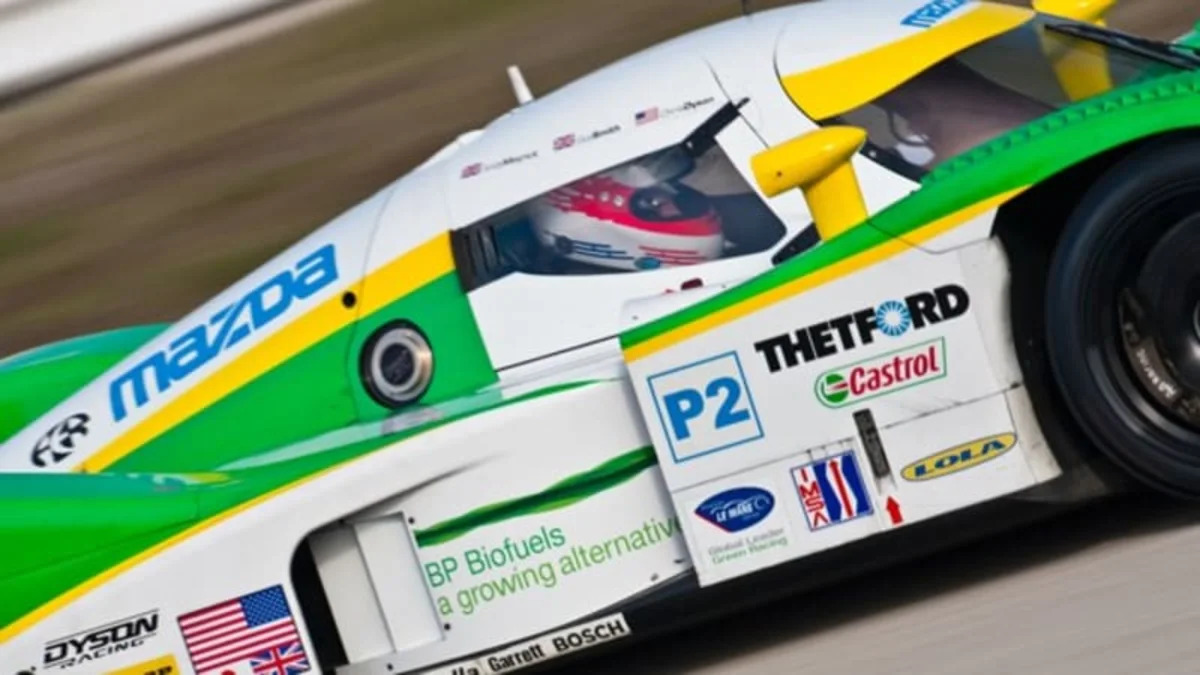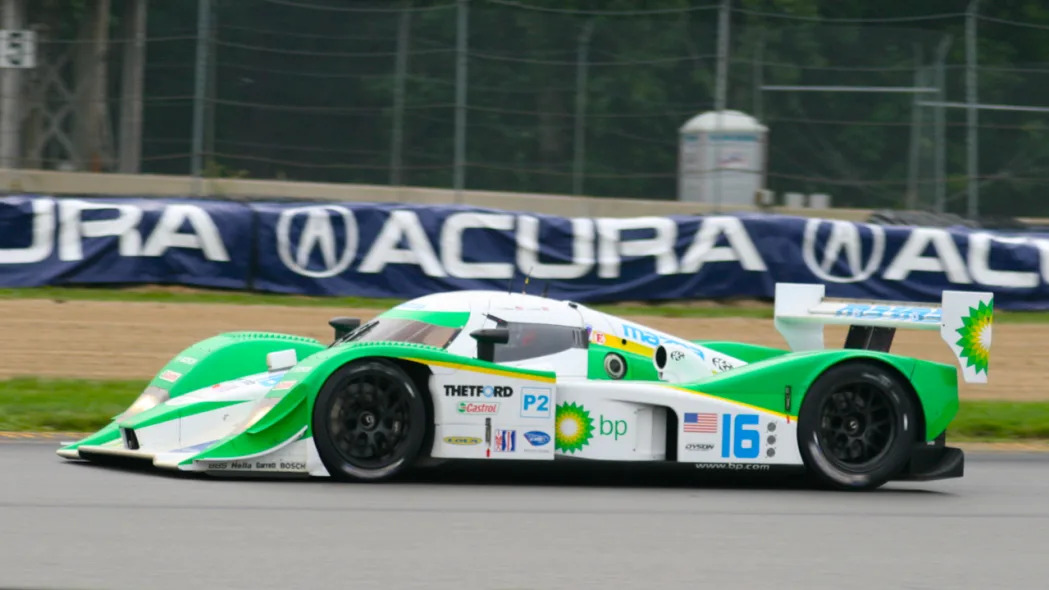As expected, the Dyson Racing Team, MazdaSpeed and BP announced today that the Lola-Mazda cars will be running on a new blend of biobutanol and ethanol for the 2010 American Le Mans Series Season. The International Motor Sports Association (IMSA), which handles the technical regulations for ALMS, put out a technical bulletin last week announcing that iBE20 had been approved for use in LMP-class cars this year. The Dyson team ran one of its two cars unclassified as a test during the last two races of the 2009 season.
iBE20 was developed by a partnership between BP and Dupont and is a blend of 20 percent biobutanol and 80 percent ethanol. The butanol is currently being produced from corn and sugarcane, but BP is developing processes to produce it from cellulosic feedstocks.
iBE20 was developed by a partnership between BP and Dupont and is a blend of 20 percent biobutanol and 80 percent ethanol. The butanol is currently being produced from corn and sugarcane, but BP is developing processes to produce it from cellulosic feedstocks.
All photos Copyright ©2009 Sam Abuelsamid / Weblogs, Inc.
[Source: Mazda]
PRESS RELEASE
BP AND MAZDASPEED Motorsports Development introduce advanced bio-race fuel in 2010 ALMS series
March 15, 2010 (Chicago, IL) – BP is pleased to announce the introduction of a new advanced bio race fuel utilizing isobutanol and ethanol in the 2010 American LeMans Series (ALMS). BP is a leader in research and development of biofuels and is using the world's leading sports car series to test cutting edge fuel blends in high performance engines. Experience gained on the race course could influence how biofuels are developed for broader transportation use by everyday drivers.
The isobutanol fuel component is of particular interest to BP and its development partner DuPont who, through their Butamax™ Advanced Biofuels joint venture, are developing commercial facilities to manufacture isobutanol for mainstream use. Though numerous biofuel options exist, BP is focusing on isobutanol, which offers high octane and greater energy density than other biofuel options. BP has partnered with Mazda to develop a viable bio race fuel for the Mazda-powered entry in the American Le Mans Series' 2010 season that begins March 20 with the 58th Mobil 1 Twelve Hours of Sebring presented by Fresh from Florida.
"The smaller turbo-charged engines of the ALMS series offer a valuable test-bed for evaluating fuels that can offer the best performance, and Mazda brings a wealth of knowledge and experience that will help us develop the best fuels," said Tim Hayes, vice president, strategic accounts for BP. "BP sees this as a great opportunity to test and learn about the performance and capability of these advanced fuels and their respective components like isobutanol and ethanol."
This effort is based on extensive research by BP and the Mazda team which together ran the fuel in the final two races of 2009 as a demonstration program. The fuel performed flawlessly in those two races and in fact was laps ahead of all LMP2 entrants at the petit Le Mans event in Atlanta. Now, for the entire 2010 season, the effort will focus on race wins, points, and a championship.
"We're pleased to take the technical relationship between Mazda and BP to this next step," said Robert Davis, senior vice president, Product Development and Quality for Mazda North American operations, and the man responsible for the company's North American motorsport programs under the MAZDASPEED Motorsports Development banner. "This is a great opportunity to combine learnings from advanced fuels with a production-derived 2.0-liter turbocharged MZR-R engine. It shows the commitment that both Mazda and BP have to understanding advanced clean, efficient, and environmentally sensitive technologies, and leveraging the learnings to bring relevant technologies to the public in the future."
BP is also pleased to be working with their partners from the International Motor Sports Association (IMSA) and ALMS as an official fuel provider to the ALMS series in 2010. This race series, with its endorsement from the EPA and DOE, and their focus on the green challenge performance is an ideal test bed to understand new fuel and vehicle technologies.
"Once again, the American Le Mans Series presented by Tequila Patrón continues to stand alone in the leadership of green racing," said Scott Atherton, series president and CEO. "The experiment by BP, MAZDASPEED and Dyson Racing to compete at the end of 2009 with iso-butanol was an unqualified success on a number of levels. It also serves as another example of our participating manufacturers, teams and partners working hand-in-hand with the American Le Mans Series to develop, produce and display tomorrow's automotive advancements and innovations in today's motorsports environment. The race to energy independence and sustainable, clean transportation solutions is one that involves all of us – and ultimately we will win together."
BP is a leading energy company with significant investments in advanced biofuels. The company is pursuing biofuels that make both a contribution to energy security and a material reduction in greenhouse gas emissions compared with conventional fuels. BP is committed to using economically and environmentally sustainable feedstocks and is developing new technologies to make good biofuels even better. Participation in ALMS competition offers BP a unique opportunity to produce new fuels and biofuel components, as well as demonstrate the performance of these fuels.
Based on its long-term vision for technology development, known as 'Sustainable Zoom-Zoom', Mazda is striving to improve the eco-friendly performance of its products, including the improvement of fuel economy of Mazda vehicles sold globally by an average 30 percent by 2015. The use of motorsports from an R&D perspective allows Mazda to demonstrate that performance and sustainability are not mutually exclusive.
Headquartered in Irvine, Calif., Mazda North American Operations oversees the sales, marketing, parts and customer service support of Mazda vehicles in the United States, Canada and Mexico through more than 850 dealers. Operations in Canada are managed by Mazda Canada, Inc., located in Ontario, Canada, and in Mexico by Mazda Motor de Mexico in Mexico City.
Isobutanol facts:
Isobutanol has a higher energy content per gallon than many first generation biofuels;
Isobutanol does not absorb water and can be transported through the existing oil and gasoline distribution infrastructure;
Isobutanol can be used in gasoline-powered vehicles without modification at higher volumes than first generation biofuels, enabling greater concentrations of renewables into the transport fuel mix.
Production:
Initially, isobutanol will be produced from feedstocks such as corn and sugarcane. Subsequently, isobutanol production can be based on cellulosic feedstocks and, eventually, advanced feedstocks such as macroalgae.
More information about Butamax™ Advanced Biofuels LLC, the BP-DuPont joint venture to commercialize isobutanol, can be found at: http://www.butamax.com.
Environmental Benefits:
Initial indications are that, on the same feedstock basis, isobutanol delivers emission reductions that are at least as good as ethanol. Isobutanol's low vapor pressure (lower than gasoline), means that vapor pressure specifications do not need to be compromised.



Sign in to post
Please sign in to leave a comment.
Continue